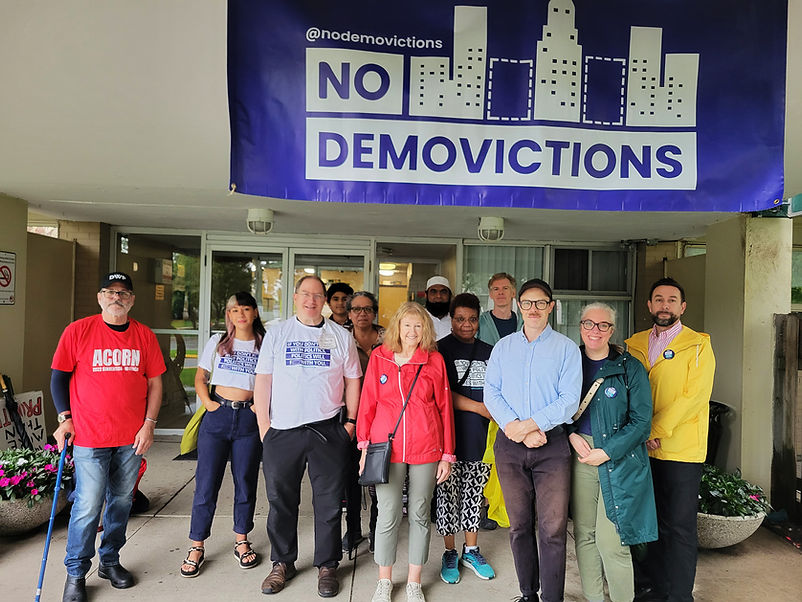THE GREEN LINE
DOCUMENTERS NOTES
Toronto’s rental replacement bylaws need more protections for tenants, housing activists say
The Planning and Housing committee passed a motion to improve protections for demovicted tenants, but activists say it still doesn’t go far enough.

purpose-built rentals in Thorncliffe park neighbourhood


Sebastian Tansil
Caring mastermind who loves spending quality time with friends and family. Empathetic and precise economist by training. Loves amber yellow as it reminds him of people dearest to him.
April 18, 2025
These city meeting notes are part of Documenters Canada. Learn more about our program here.
The Planning and Housing Committee met at City Hall on April 10 to discuss rental replacement guidelines for tenants facing demovictions and property owners.
A demoviction is when a tenant is displaced as a result of their home being demolished. The guidelines are contained in a new handbook produced by city staff. The committee room was packed with housing advocates and tenant associations who delivered several deputations throughout the meeting.
In November and December 2024, city planning staff launched a consultation process with various stakeholders, such as tenant organizations and developers, to obtain feedback on Toronto’s rental replacement implementation policies. The results of those consultations, led by Dillon Consulting, were reported to the Planning and Housing Committee.
‘A dramatic downgrade'
Miso Choi, a Toronto tenant, said the current recommendations put forward in the rental replacement guidelines will still do “real harm” to tenants. The report proposes that very large units can be replaced using Toronto’s “Growing Up” guidelines rather than matching the size of existing units. This means her neighbours in three bedroom houses could lose an average of 650 square feet–a “dramatic downgrade”. There is also no requirement to replace features essential to some tenants, such as private outdoor spaces and storage areas, she said.
“My parents’ multiplex has a shared backyard that my mom and her neighbour have tended for over 40 years. Every summer our family gathers around the barbeque. My dad, a carpenter, depends on the large basement for his tools and storage. These aren’t luxuries, they’re necessities for my family,” Choi said.
Choi argued that if tenants are forced into a downgrade in spaces and amenities, there should be a rent reduction, highlighting that the Building Industry and Land Development Association (BILD) understands this principle.
“In their submission they [BILD] suggest that tenants who move into larger units should pay more rent to reflect the upgrade. Fair enough, but let’s flip that logic. If we’re being forced into a downgrade, where’s our rent reduction?” Choi asked.
Nonetheless Choi urged the committee to accept the recommendations in Coun. Matlow’s motion because she described the rental replacement guidelines as “a lifeline for tenants, especially vulnerable tenants who cannot afford further delays”.
‘Severe stress'
Belinda Morris, a member of the 25 St. Mary Street Tenants’ Association, said she was attending as the power of attorney of her mother, Christina Morris, an elderly and disabled tenant at 25 St. Mary Street. She said her mother is facing “physical and financial hardship” as a result of an approved pending demolition and the difficulty of finding rental housing. This challenge is made worse due to long term care home shortages and a very long waitlist, Morris said.
“All of this has placed her under severe stress. It is placing all elderly tenants in the building under severe stress,” Morris said.
Morris said she supports No Demovictions' recommendations on behalf of the 25 St. Mary Street tenants.
Megan Kee, a volunter with No Demovictions, said building demolition notices need to be more thoroughly communicated to all affected tenants inclusively in every possible relevant language.
She cited an example of No Demovictions door-knocking in a purpose-built rental at 48 Grenoble Drive in 2023, two days prior to the community council meeting, where approval for the demolition would be voted on.

NO DEMOVICTIONS ACTIVISTS OUTSIDE 48 GRENOBLE DRIVE.
 : NO DEMOVICTIONS
: NO DEMOVICTIONS
“Half the tenants, many of whom were newcomers or didn’t speak English, had no idea that their building was being demolished,” Kee said.
In order to support tenants at every stage of the demoviction process, Kee advocated for the creation of a third party non-profit program funded by developer fees that would provide integrated housing, legal, and mental health support for tenants experiencing a demoviction.
“Investing in social support that people need in a preventative manner is far more cost-effective than allowing them to become homeless,” Kee said.
Walied Khogali Ali, a member of Neighbourhood Pods TO, expressed his strong support for Coun. Josh Matlow’s motion, and encouraged the committee to adopt the rental replacement handbook.
Ali said the rental replacement guidelines need stronger enforcement and transparency. A lot of tenants are not aware of their rights and are left in the dark of when they can return to their units, he said. He also urged the city to require “regular public reporting on tenant relocation and right of return outcomes” and to allocate “developer-funded staff resources to monitor compliance and enforce agreements”. Currently, Toronto does not keep track of how frequently demovicted tenants return to their units.
The role of the province
Ali also pointed to provincial legislation as negatively impacting tenants dealing with the redevelopment of Toronto’s residential sector.
“Far too often the voices of tenants, especially racialized and newcomer tenants, are sidelined in the redevelopment process,” Ali said, highlighting Ontario Bill 185, the Cutting Red Tape to Build More Homes Act. He said the act “prohibits residents across Toronto or neighbourhood associations from even appealing development applications”.
Councillor and committee chair Gord Perks asked city staff to outline the limits of what developers could be made to pay through planning fees in terms of providing services to demovicted tenants.
City staff said that “generally speaking” planning fees are designed to meet only the anticipated costs to the municipality of processing the development application.
Coun. Perks said in his closing remarks that based on his recent conversations with tenant organizations “everyone is coming to the conclusion” the Residential Tenancies Act needs reform “desperately”.
Perks said the committee and staff are “bending over backwards” and “tying ourselves in knots and making pretzels” trying to find ways to ensure renters in Toronto have “real rights” to their housing.
“Let’s reform the piece of legislation that, frankly, I call the landlord act, because that’s the only group that it serves,” Perks said.
Lindsay Blackwell, a Toronto tenant and volunteer with No Demovictions, said that while the new rental replacement guidelines are an improvement, the new policy framework does not go far enough. She urged members of the committee to support the No Demovictions’ recommendations and Coun. Matlow’s motion.
Toronto’s consultation process
Blackwell also discussed the city consultation process itself. She highlighted how hard it has been for volunteer-led tenant organizations to provide input in Toronto’s consultation process. Blackwell called on the Planning and Housing committee to make more space for their voices to be heard.
“Tenants experience a massive disadvantage in these stakeholder engagement processes because there are power asymmetries. Let’s be clear, tenants are not just stakeholders, we are rights holders. If this committee wants to protect tenants and their rights, we need stronger policies and a stronger process to build them,” she said.
Blackwell said the difficulty of being a tenant with limited power and time to participate in policy making made her think of an Anishinaabe teaching.
“In the face of a great fire, [the] little tiny hummingbird carries drops of water in its beak to put the fire out. The other animals look at the hummingbird and they say: ‘what is the point of what you are doing?’. The hummingbird says ‘I’m doing what I can’. And that’s me, and that’s my neighbours, and that’s every tenant showing up to fight for a fair and just housing system,” she said.
meeting outcome
What were the results of the discussions?
The Housing and Planning Committee approved Coun. Matlow’s motion to get City Council to request the Chief Planner and Executive Director, City Planning, to report to the Planning and Housing Committee prior to January 23, 2026. The report will be on potential additional measures and resources to support tenants facing demovictions, including:
- The outcome of stakeholder consultation related to designing an updated process for vulnerable tenants
- An assessment of divisional resourcing supporting Rental Housing Demolition applications
- Distributing the Rental Replacement Handbook and requiring Landlords to post the Handbook on tenant boards where applicable. The city will also provide copies of the handbook at local housing help centres, community centres, libraries, and other public spaces.
The committee also voted to include requirements for home owners to provide tenants copies of the agreement at no cost.
Fact-Check Yourself
Sources and
further reading
Don't take our word for it —
check our sources for yourself.
The Green Line
The Green Line
The Green Line
Care about our city, but don't know how to make it better? Sign up for simple, step-by-step guides to solving problems in your neighbourhood — one small action at a time.